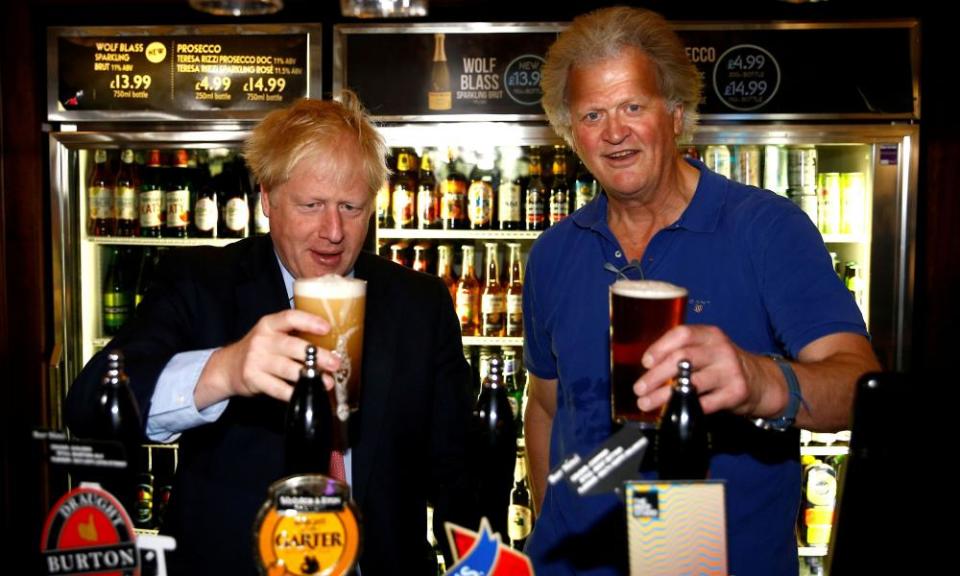The bootlicking politics of Wetherspoon will keep it in business – for now

Wetherspoon pubs occupy a strange place in British culture. For many, the chain represents a kind of egalitarian ideal – a communal boozing atmosphere unified by £3.99 pints and £1.60 coffees. A place where middle-class, leftwing art students can brush shoulders (pre-pandemic) with elderly alcoholics, united in their love of the budget boozer. The pub chain’s cheap point of entry makes it a unifying place in otherwise divided times: a place of legend (“Have you heard about the carpets? No two are the same”), of cheap kormas and pinot grigio.
But the corporate entity JD Wetherspoon Plc, headed by the eccentric, Vote Leave-donating millionaire Tim Martin is a whole other beast. Founded in 1979, Wetherspoon has become the largest pub chain in the UK, counting some 900 pubs and hotels. At a time when the hospitality industry struggles on tight margins and pubs have been experiencing mass closures, albeit at a slowing rate, the chain turned a pre-tax profit of £102.5m in 2019 (its operating profits in 2020, during the coronavirus pandemic, will likely be far lower).
It’s this conflicting identity – egalitarianism meets rightwing Euroscepticism and poor worker relations – that has secured Wetherspoon’s a place in our public zeitgeist (it is, of course, not the only pub chain with cheap food or booze). Writers and journalists have grappled with and pored over this dichotomy, deconstructing the pub chain-cum-cultural phenomenon in newspaper columns and poems alike.
Wetherspoon has become a useful political tool for Martin’s Brexiteering. Last month, the company produced posters for its pubs – part-promotion, part-propaganda – that praised the chancellor for his VAT cuts, part of the coronavirus bailout package announced in July.
With Rishi Sunak’s rictus grin plastered across the top, the advert reads, “Dishi Rishi, legend: the man who instigated tax equality between supermarkets and pubs,” (catchy!) next to a picture of a cheap fry-up. Another reads “Sunak’s specials” with a list of low-cost ales. Conveniently, the posters made their way into publications such as the Daily Mail, where a news story on the low prices merited a full-page reproduction.
Did Sunak sign off on the use of his grinning face next to fried eggs and a hash brown? Contacting HM Treasury does little to clear this up. I reach out to Wetherspoon, which tells me that it did not consult with Sunak as it “thinks the chancellor has a sense of humour”, while adding that the reproduction of these posters in newspapers was merely a coincidence and not paid advertising. “Interesting fact,” they tell me, “Wetherspoon has never spent a penny piece on advertising in the press.”
This isn’t the first instance in which the rightwing ideology of Wetherspoon’s management has been visible during the pandemic. In March, Martin refused to close pubs until forced to by the lockdown, arguing it would do nothing to stop the spread of Covid-19. At the time, the number of cases of the virus was at about 400, rising to more than a thousand in the same week. Once Boris Johnson mandated the closure of pubs and restaurants, Martin said he couldn’t afford to pay staff before the introduction of a government scheme, encouraging around 40,000 workers to find work elsewhere. This prompted the involvement of the Bakers, Food and Allied Workers Union and 90 MPs, and resulted in the vandalism of one pub in Crystal Palace, south London, where activists spray-painted “Pay your staff” across its windows. Martin agreed to pay staff when the furlough scheme was announced.
In recent years, Wetherspoon’s Janus face has been harder to ignore. Lots of companies brand themselves differently to their corporate philosophy, but Spoons’ recent political sloganeering has intensified the chasm between its public image and internal politics. This, of course, all began around 2016, when, to the chagrin of many young, progressive Spoons punters, Martin came out as an arch Brexiteer, publishing pro-Brexit editorials in the company’s magazine, Wetherspoon News, distributing pro-Brexit beer mats and eliminating some European drinks brands from its menu even before the vote (goodbye Champagne, hello Hardy’s Sparkling Pinot Chardonnay).
So what does a hospitality company using the face of a Tory politician to promote cheap booze say about these strange times? Sunak’s face plastered across an ad seems more suited for a quasi-authoritarian country, where large tapestries of rulers hang off buildings (a decorative addition, perhaps, to the iconic carpets?) than in the UK, where criticism of our government is a central tenet of democracy.
Related: UK hospitality and travel shares tumble after hints of second lockdown
It is also an effective piece of spin – disguising something pro-business and pro-profit as pro-people. Behind their veneer of colloquialisms, the Sunak posters take a policy explicitly created to increase company revenue as something created for you: the humble punter. It valorises those in power to an unquestioning, cartoonish degree. It is bootlicking at best, politically malign at worst.
As long as the Tories are in power, Wetherspoon will do just fine. After Johnson’s win at the end of last year, the company saw its shares jump by 10%, increasing the value of Martin’s stake in the business to £531m. But after the coronavirus closures that caused an inevitable fall in sales across the industry, and increased scrutiny of how it treats its workers, Spoons’ true colours are proving harder to hide behind a gleeful, grinning face and and Curry Club Thursdays.
• Ruby Lott-Lavigna is a senior staff writer at Vice UK

 Yahoo News
Yahoo News 